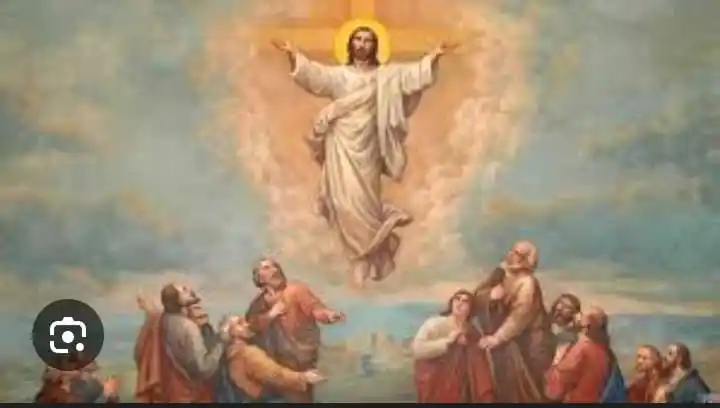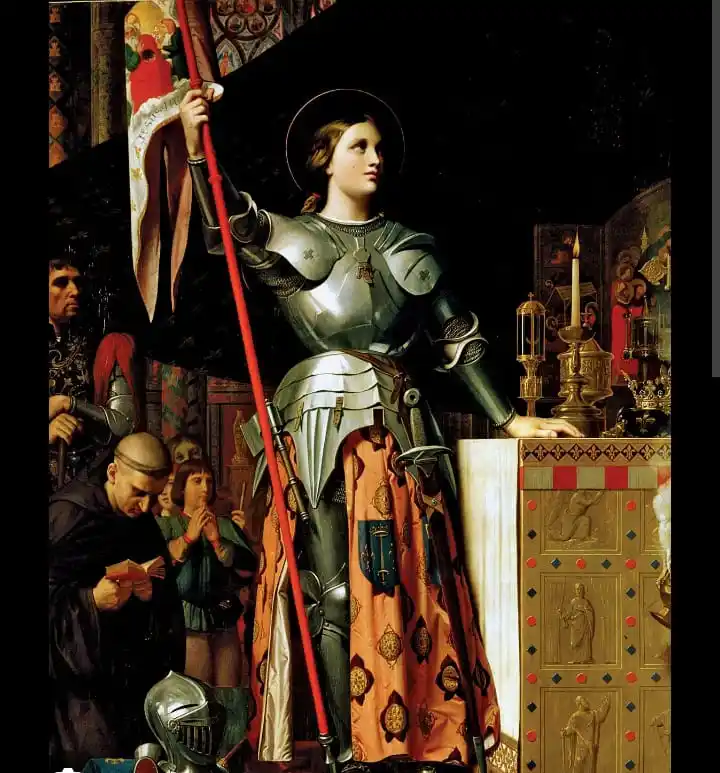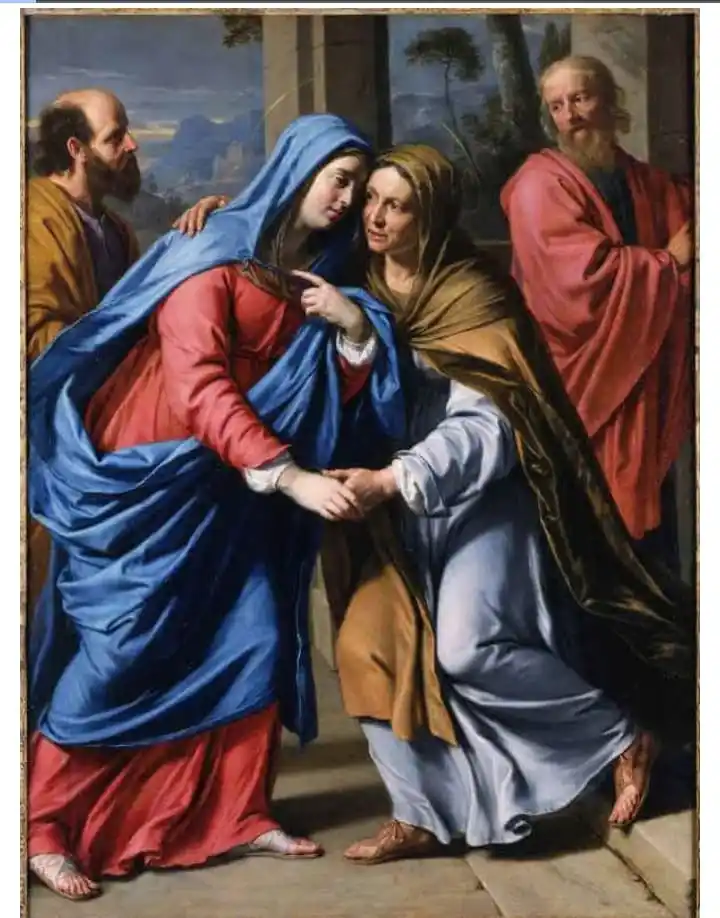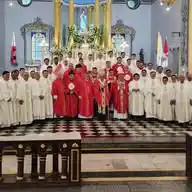
Devout Catholic
3 subscribers
About Devout Catholic
Spreading Our Beautiful faith to all ♥️
Similar Channels
Swipe to see more
Posts

*NOVENA TO THE MOST SACRED HEART OF JESUS* *Day Three* *Scripture Reading; Psalm 62:2–6. 8–9. ± V.2* *For you my soul is thirsting, O Lord, my God.* O God, you are my God, for you I long; for you my soul is thirsting. My body pines for you like a dry, weary land without water. *For you my soul is thirsting, O Lord, my God.* So I gaze on you in the sanctuary to see your strength and your glory. For your love is better than life, my lips will speak your praise. *For you my soul is thirsting, O Lord, my God.* So I will bless you all my life, in your name I will lift up my hands. My soul shall be filled as with a banquet, my mouth shall praise you with joy. *For you my soul is thirsting, O Lord, my God.* *REFLECTION; LONGING FOR GOD* “For you, my soul is thirsting, O Lord, my God.” In the depths of each one of us there is a yearning and longing that only God can satisfy. When we try to satisfy this hunger with wealth or success – even with relationships – they leave us empty because only in God will our souls find rest. It is in the tender embrace of the Sacred Heart of Jesus that our deepest longings are fulfilled. In the quiet of prayer, in the surrender of our wills, we encounter the infinite love and mercy of God. Today we turn to Jesus with open hearts and thirsty souls. Let us drink deeply from the wellspring of his compassion and tenderness. For in him alone will we find true fulfilment, true satisfaction. *Let us pray* Jesus, you have said: “Truly I say to you, if you ask anything of the Father in my name, he will give it to you.” Behold, in your name, I ask the Father for the grace of my request. (Name intention) Pray the Our Father, Hail Mary, and Glory Be. O most Sacred Heart of Jesus, I place all my trust in you. Immaculate Heart of Mary, pray for us

*NOVENA TO THE MOST SACRED HEART OF JESUS* *Day Two* *Scripture reading: Luke 1 :39–56* In those days Mary set out and went with haste to a Judean town in the hill country, where she entered the house of Zechariah and greeted Elizabeth. When Elizabeth heard Mary’s greeting, the child leaped in her womb. And Elizabeth was filled with the Holy Spirit and exclaimed with a loud cry, “Blessed are you among women, and blessed is the fruit of your womb. And why has this happened to me, that the mother of my Lord comes to me? For as soon as I heard the sound of your greeting, the child in my womb leaped for joy. And blessed is she who believed that there would be a fulfilment of what was spoken to her by the Lord.” And Mary said, “My soul magnifies the Lord, and my spirit rejoices in God my Savior, for he has looked with favour on the lowliness of his servant. Surely, from now on all generations will call me blessed; for the Mighty One has done great things for me, and holy is his name. His mercy is for those who fear him from generation to generation. He has shown strength with his arm; he has scattered the proud in the thoughts of their hearts. He has brought down the powerful from their thrones, and lifted up the lowly; he has filled the hungry with good things, and sent the rich away empty. He has helped his servant Israel, in remembrance of his mercy, according to the promise he made to our ancestors, to Abraham and to his descendants forever.” And Mary remained with her about three months and then returned to her home. *REFLECTION; Mary set out and went with haste* Mary was pregnant – with God inside her – and she set out on a mighty journey, driven by the needs of her elderly cousin. She didn’t hold back or stay indifferent. This story can draw me out of myself, to wonder about the needs around me. Many people in our world eagerly await visits from those who care about them. The elderly, the sick, the imprisoned, and refugees all need a compassionate glance, a visit from a caring neighbour who puts the needs of others first. Mary shows us that when Christ is within us, he moves us to be with others in moments of sharing, love and service. From her meeting with Elizabeth, Mary’s Magnificat emerges—a song of hope for the world’s transformation. It reminds us that when Jesus is in us we can bring His love to everyone we meet, sparking changing the world, bit by bit, through powerful encounters and acts of service. As we continue our novena to the Sacred Heart, we ask what act of love and service God might be calling us to do. We ask for the grace to ‘set out and go quickly’ like Mary our Mother. *Let us pray* Jesus, you have said: “Truly I say to you, if you ask anything of the Father in my name, he will give it to you.” Behold, in your name, I ask the Father for the grace of my request. (Name intention) Pray the Our Father, Hail Mary, and Glory Be. O most Sacred Heart of Jesus, I place all my trust in you.

We may ask: how do I feel about Christ’s obedience unto death, how does it touch me, and what role do I play in the mystery being celebrated on Ascension of the Lord? What is being asked of me as a follower of Christ? Perhaps we may feel little or nothing of note to reply to these questions, but we must not think for a moment that the saving events of Christ’s life, death, Resurrection and Ascension have no meaning in our lives. We are all united to Christ and one another in the great mystery of salvation in Jesus Christ. We have “put on Christ,” Saint Paul tells us, by the fact of our Baptism, so we cannot so easily walk away from the light and life being offered us in the Church. Of course, we have free will and cannot be stopped from rejecting God’s call, but the challenge is to cultivate God’s life within us in order to bear lasting fruit. We all must learn throughout our earthly sojourn what it means to really belong to Christ, to forget ourselves that others may have and to take up our cross each day and embrace our vocation without compromise. We are asked to follow the Lord without fear or regret. This is no easy task, but with the help of God’s Holy Spirit, the promised Comforter, we can make progress in virtue and humility, asked of us by our having “put on Christ” at baptism. In the celebration of the Lord’s Ascension we rejoice greatly for the assurance that future glory is realized in Jesus Christ and offered to the human race. This gift encourages us to desire deeply and always the glory of heaven. We wish to go to heaven where Christ has gone. The apostles are asked by the angels, “Why are you gazing in astonishment at the sky? Just as you have seen Him ascend into heaven, so, in like manner, shall He return” (Acts 1.11). In the meantime, we are asked to put our hands to work and our hearts to God, doing the will of God, in preparation for the return of our Savior at our death and at Christ’s second coming in glory. The Sacrament of the Eucharist is the source of strength for those who witness to Christ. We celebrate the Eucharist to dispose ourselves more completely to all that God has in store for those whom God loves and who love God. We ideally gather in a place of worship, where we ponder God’s mercy, learning how the suffering of Christ becomes a way to glory. Where Christ has gone we hope to follow. Each liturgical action is meant to lift us up further in joy and wonder for everything that God has accomplished on our behalf in Jesus Christ. The risen and ascended Christ now reigns over creation, enabling the followers of Jesus to use their spiritual gifts for building up the body of Christ, the Church. The Ascension is linked to the Church’s mission in all ages and is part of the dynamism that makes Christ known from generation to generation, to the ends of the earth. May we never cease to thank God for bestowing such great gifts upon us individually and as a Church. #AscensionThursday #Easter2025

She then enjoyed a series of spectacular military successes, during which the King was able to enter Rheims and be crowned with her at his side. In May 1430, as she was attempting to relieve Compiegne, she was captured by the Burgundians and sold to the English when Charles and the French did nothing to save her. After months of imprisonment, she was tried at Rouen by a tribunal presided over by the infamous Peter Cauchon, Bishop of Beauvais, who hoped that the English would help him to become archbishop. Through her unfamiliarity with the technicalities of theology, Joan was trapped into making a few damaging statements. When she refused to retract the assertion that it was the saints of God who had commanded her to do what she had done, she was condemned to death as a heretic, sorceress, and adulteress, and burned at the stake on May 30, 1431. She was nineteen years old. Some thirty years later, she was exonerated of all guilt and she was ultimately canonized in 1920, making official what the people had known for centuries. Her feast day is May 30. St. Joan was canonized in 1920 by Pope Benedict XV. *_St. Joan of arc, pray for us_*

*SOLEMNITY OF THE ASCENSION OF THE LORD, YEAR C*. *REFLECTION* *THEME; FUTURE GLORY IS REALIZED IN JESUS CHRIST AND OFFERED TO THE HUMAN RACE* We celebrate our Lord’s Ascension today which took place forty days after his Resurrection. We recount with joy the day when Christ completed his earthly mission and returned to the Father to reign in majesty and to be the judge of the living and the dead. It seems we just began our Paschal celebrations and now this pivotal liturgical season is drawing to a close. That is how life seems to goes, what has been called an “infinity of little hours.” However, it is precisely there, in the midst of the mundane, that we are being invited to encounter the God who has not left us orphans, but lives among us and who loves us until the end of time. Christ completed the Father’s work on earth as a mission of obedience to the will of God. Its purpose was and is to bring eternal life to every human being.


*PENTECOST NOVENA* *Day 1 - A New Birth in the Holy Spirit* Nicodemus said, “How can anyone who is already old be born? Is it possible to go back into the womb again and be born?” Jesus replied: “In all truth I tell you, no one can enter the kingdom of God without being born through the water and the Spirit; what is born of human nature is human; what is born of the Spirit is spirit. Do not be surprised when I say: You must be born from above. The wind blows where it pleases; you can hear its sound, but you cannot tell where it comes from or where it is going. So it is with everyone who is born of the Spirit.” John, 3: 4-8 *Reflection* Jesus shows a new way - a way of becoming like a child again, of placing ourselves once more in the hands of our Creator. It is a way of trust and transformation - of letting go of our human certainties and securities, of taking off our cloaks and masks so as once again to feel the Spirit’s breath against our skin. It is a call to become both a new person and a new people: the people of God, His holy Church. Do I recognise in my- self the need, the desire for this newness of life? Jesus wants to give us this new life in the Spirit, who will guide and lead us from darkness to light, from half-heartedness to the fullness of life. *Let us pray* Come, Holy Spirit! Fall afresh on Your people Purify and cleanse us Open our hearts to receive Your gifts So that we may be born again in You. Amen. *PRAYER OF CONSECRATION TO THE HOLY SPIRIT* HOLY SPIRIT On my knees before the great multitude of heavenly witnesses, I offer my- self, body and soul to You, Eternal Spirit of God. I adore the brightness of Your purity, the unerring keenness of Your justice, and the might of Your love. You are the Strength and Light of my soul. In You I live and move. I desire never to grieve You by unfaithfulness to grace and I pray with all my heart to be kept from the smallest sin against You. Mercifully guard my every thought and grant that I may always watch for Your light, and listen to Your voice, and follow Your gracious inspirations. I cling to You and give myself to You and ask You, by Your compassion to watch over me in my weakness. Holding the pierced Feet of Jesus and looking at His Five Wounds, and trusting in His Precious Blood and adoring His opened Side and stricken Heart, I implore You, Adorable Spirit, Helper of my infirmity, to keep me in Your grace that I may never sin against You. Give me grace, O Holy Spirit, Spirit of the Father and the Son to say to You always and every- where, "Speak Lord for Your servant is listening." Amen. *PRAYER FOR THE SEVEN GIFTS OF THE HOLY SPIRIT* Lord Jesus Christ, before ascending into heaven You promised to send the Holy Spirit to finish Your work in the souls of Your Apostles and Disciples. Grant the same Holy Spirit to me that He may perfect in my soul, the work of Your grace and Your love. Grant me the Spirit of Wisdom that I may despise the perishable things of this world and only desire the things that are eternal; the Spirit of Understanding to enlighten my mind with the light of Your di- vine truth; the Spirit of Counsel that I may always choose the way of pleasing God and gaining heaven; the Spirit of Fortitude that I may bear my cross with You and overcome with courage all the obstacles that oppose my salva- tion; the Spirit of Knowledge that I may know God and myself and grow perfect on the path to holiness; the Spirit of Piety that I may seek to serve God and His Church; and the Spirit of Fear and Awe that I may be filled with a loving reverence towards God and may dread in any way to displease Him. Mark me, dear Lord, with the sign of Your true disciples and inspire me in all things with Your Spirit. Amen. *_For the Intentions of the Holy Father Pope Leo XIV;_* Our Father... Hail Mary... Glory be...

*_May 30th ~ Memorial of St. Joan of arc, Patroness of France_* St. Joan of Arc is the patroness of soldiers and of France. On January 6, 1412, Joan of Arc was born to pious parents of the French peasant class, at the obscure village of Domremy, near the province of Lorraine. At a very early age, she heard voices: those of St. Michael, St. Catherine and St. Margaret. At first the messages were personal and general. Then at last came the crowning order. In May, 1428, her voices “of St. Michael, St. Catherine, and St. Margaret” told Joan to go to the King of France and help him reconquer his kingdom. For at that time the English king was after the throne of France, and the Duke of Burgundy, the chief rival of the French king, was siding with him and gobbling up evermore French territory. After overcoming opposition from churchmen and courtiers, the seventeen year old girl was given a small army with which she raised the seige of Orleans on May 8, 1429.


Near the end of the 17th century, Emperor Leopold I of Austria took refuge in the Shrine of Mary Help of Christians at Pasau, when 200,000 Ottoman Turks besieged the capital city of Vienna, but a great victory occurred thanks to Mary Help of Christians: on September 8th, Feast of Our Lady's Birthday, plans were drawn for the battle. On September 12, Feast of the Holy Name of Mary, Vienna was finally freed through the intercession of Mary Help of Christians. All Europe had joined with the Emperor crying out "Mary, Help!" and praying the Holy rosary. In 1809, Napoleon's men entered the Vatican, arrested Pius VII and brought him in chains to Grenoble, and eventually Fontainbleau. His imprisonment lasted five years. The Holy Father vowed to God that , if he were restored to the Roman See, he would institute a special feast in honor of Mary. Military reverses forced Napoleon to release the Pope, and on May 24th 1814, Pius VII returned in triumph to Rome. Twelve months later, the Pope decreed that the feast of Mary Help of Christians, be kept on the 24th of May. St. John Bosco (1815 - 1888) was a dynamic priest who founded the Salesian Order in the XIX century in Italy. His many prophetic dreams, beginning at age nine, guided his ministry and gave insights on future events. On May 14, 1862, Don Bosco dreamed about the battles the Church would face in the latter days. In his dream, the Pope of those days anchors the 'ship' of the Church between two pillars, one with a statue of Mary (Auxilium Christianorum or 'Help of Christians') and the other with a large Eucharistic Host St. John Bosco wrote about his congregation, the Salesians: "The principal objective is to promote veneration of the Blessed Sacrament and devotion to Mary Help of Christians. This title seems to please the august Queen of Heaven very much." The Salesian Sisters of St John Bosco or Daughters of Mary Help of Christians, are the sister order of the Salesians of Don Bosco. St. John Bosco, himself, on June 9 1868, dedicated to Our Lady Help of Christians, the mother church of his congregation at Turin (Italy). The Salesian Fathers and their Sisters have carried the devotion to their numerous establishments. *_Our Lady Help of Christians, pray for us_*

In the fourteenth century, the Church suffered internally from the Western Schism. In 1378, two men claimed to be the pope. Pope Urban VI resided in Rome, and the anti-pope Clement VII resided in Avignon, France. In 1389, Pope Urban VI instituted the Feast of the Visitation to ask the . Luke tells us that she traveled “in haste.” Though a tiny child within Mary’s womb, the Savior was also God. He had divine knowledge. In His divinity, God the Son desired that His mother assist Elizabeth in her pregnancy and desired to sanctify John the Baptist within his mother’s womb. In this journey “in haste” we see the Son of God’s desire to pour forth His sanctifying grace upon His precursor, John, within the womb. Jesus, within the womb, inspired His mother to make the journey to fulfill His divine will. The “haste” also affected our Blessed Mother. Filled with the Holy Spirit and carrying the Eternal God within her womb, her motherly heart would have sensed her Divine Son’s longing to bestow His first gift of sanctifying grace upon John. She was compelled to travel quickly to Elizabeth so that her Son could fulfill His will. When Mary reached Elizabeth, Elizabeth cried out, “Most blessed are you among women, and blessed is the fruit of your womb.” She called Mary “the mother of my Lord” and revealed that at the moment Mary greeted her, John leapt for joy. Spiritual joy is a reaction to grace, and John encountered grace in that moment. Saint Thomas Aquinas wrote that John the Baptist was delivered from Original Sin at that moment and speculated that divine grace might have accelerated John’s use of human reason within the womb to “acknowledge, believe, and consent” (Summa Theologica 3.27.6). The Visitation reveals much about the Blessed Mother. Immediately after her exchange with Elizabeth, Mary sings her Magnificat, glorifying God for His greatness and perfect plan and revealing the beauty of her own soul. The Blessed Mother speaks of her “lowliness” (humility) and that “all ages” will call her blessed. She reveals that God has done “great things” for her because she had a holy fear of the Lord. She further reveals that in her lowly state, God will exalt her, as He will exalt all who humble themselves before Him. The Church greatly needs the intercession of the Blessed Virgin Mary, the Mediatrix of Grace. She is the instrument through which grace entered the world in the Person of her Son. Just as Pope Urban VI saw a need to heal the Church through Mary’s intercession in the fourteenth century, so the Church is also in need of healing today. The haste with which Mary traveled to Elizabeth to introduce her cousin and the child in her womb to the Savior tells us we must not take a lackadaisical approach to evangelization. We must imitate Mary’s holy drive.

*_May 31st ~ Feast of the Visitation of Our Lady_* In the fourteenth century, the Church suffered internally from the Western Schism. In 1378, two men claimed to be the pope. Pope Urban VI resided in Rome, and the anti-pope Clement VII resided in Avignon, France. In 1389, Pope Urban VI instituted the Feast of the Visitation to ask the universal Church to pray to the Blessed Virgin Mary for unity and peace. The Council in Constance in 1417 finally settled the division. Though internal Church conflict led to this feast’s institution, its inspiration is Saint Luke’s glorious story in the first chapter of his Gospel. After the Annunciation, God became man within the Blessed Mother’s womb. Most likely, Mary traveled to be with her cousin Elizabeth within a month of conceiving the Savior of the World. Thus, she traveled as a tabernacle of the Most High.














